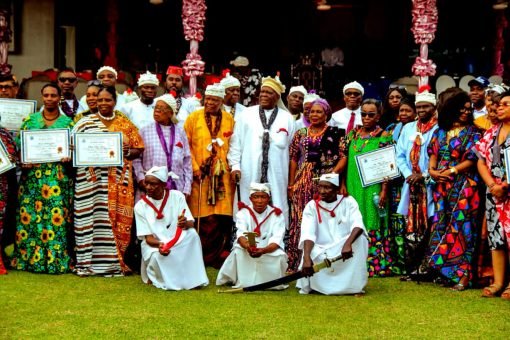It was an emotional homecoming steeped in history and spirit. Eighty-one people of African descent from across the world have finally traced their ancestral roots to the Efik Eburutu Kingdom in Cross River State.
They were formally received and inducted into the Royal Houses of the Palace of the Obong of Calabar — a kingdom that once stood as a major gateway between Africa and the Caribbean during the transatlantic slave trade centuries ago.
The returnees came from Barbados, the United States, the United Kingdom, Canada, France, Trinidad and Tobago, Jamaica, Curacao, Ghana, Uganda, the Dominican Republic, and several other countries where descendants of enslaved Africans have long sought connection with their heritage.
Obong Welcomes Returnees as Bonafide Sons and Daughters
The Obong of Calabar, His Eminence Edidem Ekpo Okon Abasi-Otu V, performed the traditional naming and induction ceremony at his palace on Efanga Nsa Street in Calabar South.
He described the moment as sacred and deeply symbolic, calling it a restoration of broken lineage and lost identity.
“With this induction, I welcome all of you back as bonafide sons and daughters of the ancient Efik Eburutu kingdom,” the monarch declared. “You are now members of our Royal Houses. I believe that henceforth, you will not forget that you are Efiks and that this is your home.”
He urged the Etuboms — patriarchs of the royal families — to receive the new members with open arms, granting them the same rights, respect, and privileges accorded to all members of the royal lineage.
The Obong added that the Efik people have always embraced their dispersed kin, believing that the spirit of ancestry remains unbroken despite centuries of separation.
Call for reconnection and investment in Calabar
The Obong also encouraged the inductees to maintain contact with their new families, visit regularly, and invest in local initiatives that could benefit both the diaspora and residents of Cross River State.
“We expect you to come home from time to time,” he said. “Participate in family activities, create business opportunities, and strengthen the bond between our people here and abroad.”
He commended the Cross River State Government for its collaboration with diaspora groups, saying the long-term benefits of cultural reconnection would extend beyond tourism to social and economic growth.
“This bold effort to reach out to our people in the diaspora will pay off in generations to come,” he noted.
Returnees Receive Efik Names and Full Traditional Rights
Each returnee was ceremonially blessed and issued a certificate bearing a new Efik name, symbolising their spiritual and cultural rebirth. The certificates were presented by the Etuboms of the various Royal Houses, officially linking each returnee to a family line within the Efik nation.
One of the organisers and representatives of the group, Dr. Rev. Mrs. Nkwa Edet Otu, said the moment marked the fulfillment of a lifelong search for identity.
“With these certificates, we have received what rightly belonged to us,” she said. “I feel that I and my fellow diasporas are now finally back home. We all feel so special with this connection to our roots. Thank you, His Eminence, and our traditional leaders, for welcoming us.”
Reports indicate that many of the inductees had never before set foot on Nigerian soil. Their visit was therefore not just symbolic but also deeply personal — a return that bridges centuries of displacement and separation.
According to local historians, the induction grants them the right to participate in certain traditional rites, community festivals, and even local political discussions — privileges normally reserved for members of Efik royal families.
Their adoption, elders say, completes a spiritual circle long disrupted by slavery, bringing the descendants of Africa’s lost children back to the ancestral hearth.
Rate, Like 👍, Comment 💬, Share this article, Follow us on our social media handles, and Submit your own story to get featured and earn rewards!







